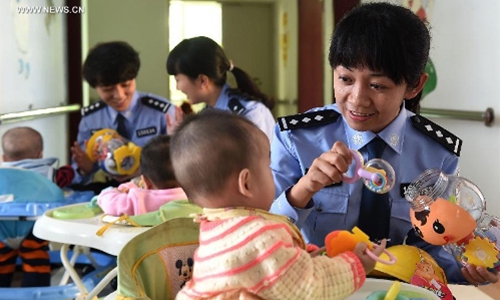China cracks down on illegal online adoptions after rape allegations against foster father emerge

Policewomen of the Kaiyuan Railway Public Security Station look in rescued trafficked babies at the Kaiyuan Children's Welfare Center in Kaiyuan, Southwest China's Yunnan Province, November 11, 2014. File Photo: Xinhua
Chinese internet giants, including Tencent and Q&A platform Zhihu vowed to investigate and shut down chatrooms and messages on baby trafficking through illegal adoptions after widespread anger emerged over online platforms that help child trafficking. The move comes after a foster father was accused of raping his adopted daughter.
An 18-year-old girl has accused her adoptive father Bao Yuming, a lawyer, of sexually abusing her since she was 14 when Bao illegally adopted her through an online platform.
Media reports have revealed that online adoption has been a gray industry that thrives on social media platforms, including Tencent QQ, and Zhihu, spawning an industrial chain with services ranging from baby adoption to household registration.
Zhihu was reported to be full of illegal messages and posts, with some even listing prices starting at 100,000 yuan. The internet company responded on Monday and said they have since cleared all illegal child trafficking advertising and permanently closed accounts that were connected to such services.
Tencent announced on Tuesday it would increase security efforts against crimes involving illegal online child adoption.
"Chinese law prohibits child trafficking in the name of adoption, and Tencent QQ has a zero-tolerance for such crimes," said the statement.
Global Times learned that some online baby trafficking chatrooms were disguised as charitable organizations, for example, those that helped lost children find their homes or agencies providing nurses or babysitters. There were some that even advertised "private baby adoption pool" for couples who wanted a child.
Intermediaries, also known as group chat founders, often leave comments on related message threads or topic discussions to entice interested baby buyers or sellers. Potential clients often have to go through rounds of identity checks to test credibility until they are trusted, or make payments, to join the actual transaction group posting pictures of kids or toddlers with price tags attached as "lactation reimbursement" or "thanks fee."
Selling babies in the name of adoption has grown into an industrial chain, with some even raising pregnant women for commercial adoptions, Tong Xiaojun, a child welfare studies professor with the University of Chinese Academy of Social Science, said in an earlier interview.
Clients have ordered a baby and agreed on a price with online traffickers while the mother is still in pregnant, media also reported.
Illegal online adoption has become more widespread recently due to advanced internet tools and social media platforms that provide a more covert crime space for trafficking agents, an undercover volunteer who spent years reporting and researching illegal online agents told the Global Times on Thursday.
Operators use various tactics to evade censorship and engage in illegal conduct in the name of private adoption for free, she said and explained as public security authorities continue to crackdown on such businesses.
"These middlemen are becoming more vigilant and will impose stricter identity checks on their clients, including identification requests and video chats," the undercover volunteer told the Global Times.
For illegally adopted children, gaining birth certificates and household registration are primary challenges, but they can be resolved online, as the gray industry chain leads clients to obtain falsified birth certificates and documents.
The rise of private adoption is partly due to strict preconditions for legal adoption. Chinese law mandates that single males can only adopt a female child who 40 years younger.
Similarly, a parent giving up custody needs to show that neither parent is capable of raising the child, which is difficult to prove in judicial practice, said experts, appealing Chinese policymakers to review the clauses and consider lowering the threshold for legal adoption.

